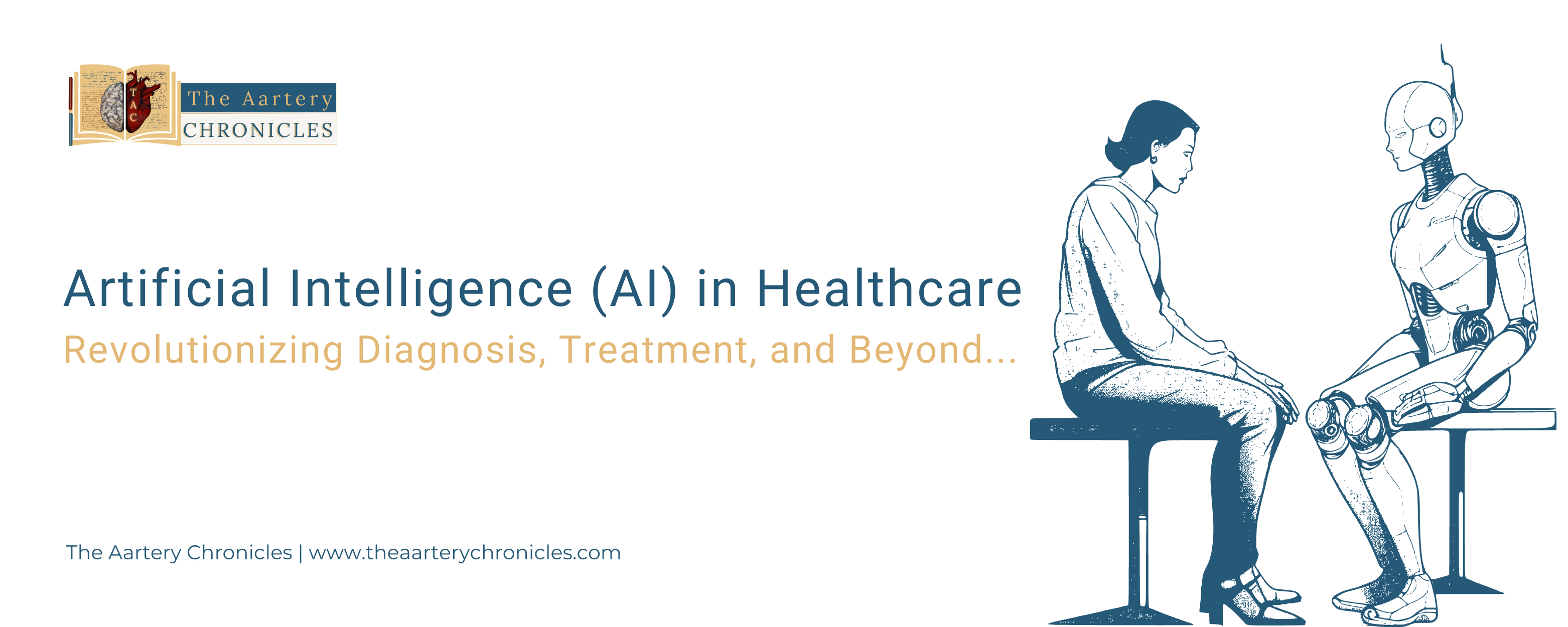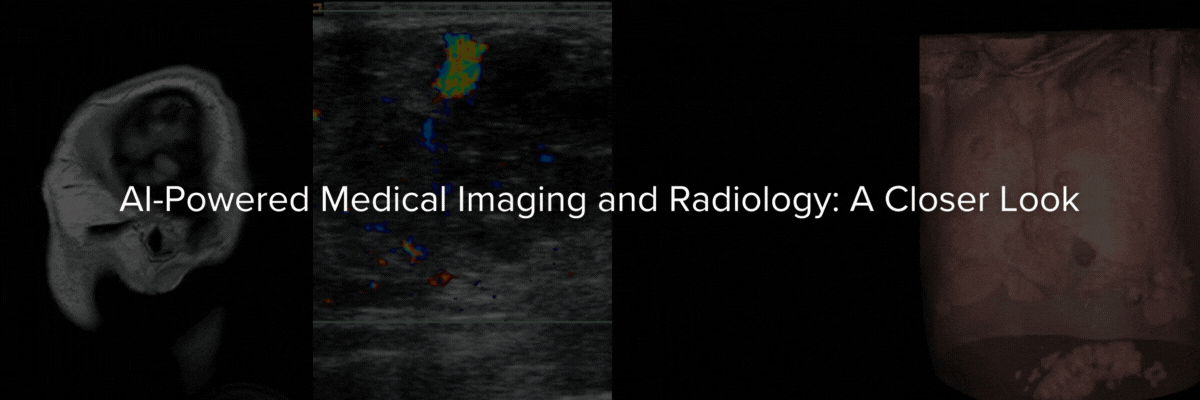
Artificial Intelligence (AI) in Healthcare: Revolutionizing Diagnosis, Treatment, and Beyond...
Artificial Intelligence (AI) has truly transformed the healthcare sector, bringing about a remarkable change in how we diagnose illnesses, apply treatments, and look after patients. In this in-depth exploration, we’ll delve into the many ways AI is changing healthcare, including its role in enhancing medical imaging, making predictions about health outcomes, the important ethical aspects to consider, and the challenges we face when blending AI with medicine.

AI-Powered Medical Imaging and Radiology: A Closer Look
AI has ushered in a new era of precision and efficiency in medical imaging, enabling healthcare professionals to glean valuable insights from complex diagnostic images. This technological leap is attributed to:
AI-Enhanced Medical Imaging: Modern AI algorithms, particularly convolutional neural networks (CNNs), possess the ability to analyze medical images such as X-rays, MRIs, and CT scans with remarkable accuracy. These algorithms can identify patterns, anomalies, and even subtle variations that may escape the human eye.
Early Detection and Diagnosis: AI aids in the early detection of diseases like cancer, cardiovascular issues, and neurological disorders by recognizing patterns that might be indicative of these conditions. For example, AI-powered mammography analysis can spot breast cancer in its earliest stages, significantly improving patient prognosis.
Personalized Treatment Plans: AI doesn’t stop at diagnosis; it also assists in devising personalized treatment plans based on individual patient data. By considering a patient’s medical history, genetic makeup, and other relevant factors, AI can recommend targeted therapies for better outcomes.
Advancements in Image Analysis: Recent advancements in AI, such as attention mechanisms and transfer learning, have led to breakthroughs in image segmentation, 3D reconstructions, and image restoration. These advancements contribute to more accurate and insightful medical image analysis.

Predictive Analytics in Healthcare Using AI: Shaping the Future of Medicine
AI-powered predictive analytics harness the potential of big data to transform the way healthcare is practised and delivered:
Data-Driven Insights: By analyzing vast datasets, AI can identify trends, anticipate disease outbreaks, and provide valuable insights into patient populations. This capability is invaluable in public health planning and resource allocation.
Early Intervention and Prevention: AI algorithms can predict patient deterioration and potential health crises, allowing healthcare providers to intervene before conditions become critical. This proactive approach can save lives and reduce the burden on healthcare systems.
Accelerating Drug Discovery: AI expedites drug discovery by analyzing molecular structures and simulating interactions between compounds and biological systems. This significantly shortens the time required for identifying potential drug candidates and expedites the development process.
Advancements in Predictive Modeling: Advanced techniques like Generative Adversarial Networks (GANs) and reinforcement learning are pushing the boundaries of predictive modelling. These approaches enable the creation of dynamic models that evolve as new data becomes available, enhancing accuracy and adaptability.

Ethical Considerations and Challenges of AI in Medicine: Navigating the Complex Terrain
The integration of AI in healthcare introduces a host of ethical and practical challenges that demand careful consideration:
Data Privacy and Security: The utilization of sensitive patient data for training AI models raises concerns about data privacy and security breaches. Striking a balance between data utility and patient confidentiality is a critical challenge.
Bias and Fairness: AI algorithms can inherit biases present in training data, leading to unequal treatment of patients from different demographics. Addressing algorithmic bias is crucial to ensure fair and equitable healthcare outcomes.
Accountability and Decision-Making: As AI systems assist in clinical decisions, determining the responsibility for errors or misdiagnoses becomes more complex. Clear guidelines and protocols are needed to assign accountability appropriately.
Regulatory Compliance: The rapid pace of AI innovation necessitates updated regulations that ensure patient safety, data protection, and ethical use of AI technologies in healthcare.
Pros and Cons of AI in Healthcare: Weighing the Benefits and Drawbacks
Pros
Enhanced Accuracy: AI augments the diagnostic capabilities of medical professionals, leading to more accurate and timely diagnoses.
Increased Accessibility: AI facilitates telemedicine and remote diagnostics, extending medical expertise to underserved regions and populations.
Personalised Treatment: AI-driven insights enable tailored treatment plans considering an individual’s unique medical history and genetic makeup.
Time-Saving: Automation of routine tasks allows healthcare providers to allocate more time to patient care and complex decision-making.
Cons
Lack of Human Touch: Over-reliance on AI might diminish the importance of direct patient-doctor interactions and the human element of care.
Technical Limitations: AI models are not infallible and can make errors, highlighting the importance of continuous human oversight.
Implementation Costs: Integrating AI into healthcare systems requires substantial investments in technology, infrastructure, and ongoing training.
Ethical Dilemmas: Balancing patient privacy, transparency, and accountability presents ongoing ethical challenges that must be navigated responsibly.
The integration of AI in healthcare has the potential to significantly improve medical practices and patient outcomes. AI-powered medical imaging and predictive analytics offer unprecedented insights, but ethical considerations and challenges must be addressed to ensure responsible and effective implementation. As AI continues to advance, its role in healthcare will evolve, ultimately leading to a more efficient, accurate, and patient-centred approach to medicine.
References:
- World Health Organization. (2021). The role of artificial intelligence within the field of medicine. Available from: https://www.who.int/europe/news/item/27-09-2022-use-of-artificial-intelligence-on-the-rise–but-its-impact-on-health-still-limited–new-study-finds
- Chartrand, G. et al. (2017). Deep Learning: A Primer for Radiologists. Radiographics, 37(7), 2113-2131. Available from: https://pubmed.ncbi.nlm.nih.gov/29131760/
- Rajkomar, A. et al. (2019). Scalable and accurate deep learning with electronic health records. NPJ Digital Medicine, 2(1), 18. Available from: https://pubmed.ncbi.nlm.nih.gov/31304302/
- Obermeyer, Z. et al. (2019). Dissecting racial bias in an algorithm used to manage the health of populations. Science, 366(6464), 447-453. Available from: https://pubmed.ncbi.nlm.nih.gov/31649194/

Author:
Dr. Malhar Mone




